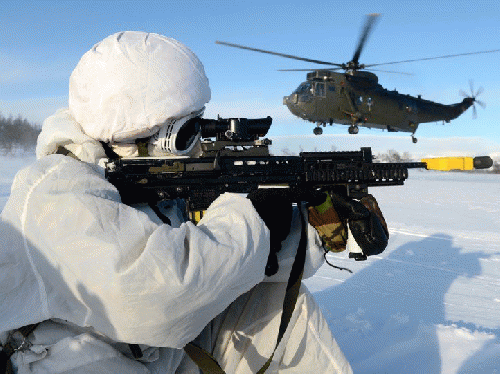Reprinted from Foreign Policy In Focus
One hundred and sixty-eight years ago this past July, two British warships -- HMS Erebus and HMS Terror -- sailed north into Baffin Bay, bound on a mission to navigate the fabled Northwest Passage between the Atlantic and the Pacific oceans. It would be the last that the 19th-century world would see of Sir John Franklin and his 128 crew members.
But the Arctic that swallowed the 1845 Franklin expedition is disappearing, its vast ice sheets thinning, its frozen straits thawing. And once again, ships are headed north, not on voyages of discovery -- the northern passages across Canada and Russia are well known today -- but to stake a claim in the globe's last great race for resources and trade routes.
How that contest plays out has much to do with the flawed legacies of World War II, which may go a long way toward determining whether the Arctic will become a theater of cooperation or -- in the words of former NATO commander and U.S. Admiral James G. Stavridis -- an "icy slope toward a zone of competition, or worse, a zone of conflict."
Opening the Northern Passage
There is a great deal at stake.
The U.S. Geological Survey estimates that the Arctic holds 13 percent of the world's oil reserves and 30 percent of its natural gas. There are also significant coal and iron ore deposits. As the ice retreats, new fishing zones are opening up, and -- most importantly -- so are shipping routes that trim thousands of miles off voyages, saving enormous amounts of time and money. Expanding trade will stimulate shipbuilding, the opening of new ports, and economic growth, especially in East Asia.
Traffic in the Northern Sea Route across Russia -- formerly known as the Northeast Passage -- is still modest but on the uptick. The easiest of the northern routes to traverse, the passage has seen an increase in shipping, from four vessels in 2010 to 71 in 2013. And for the first time in history, a liquid natural gas tanker -- the Ob River -- made the trip in 2012. On a run from Hammerfest , Norway to Tobata, Japan, the ship took only nine days to traverse the passage, cutting almost half the distance off the normal route through the Suez Canal.
Which is not to say that the Northern Sea Passage is a stroll in the garden. The Arctic may be retreating, but it is still a dangerous and stormy place, not far removed from the conditions that killed Franklin and his men. A lack of detailed maps is an ongoing problem, and most ships require the help of expensive icebreakers. But for the first time, specially reinforced tankers are making the run on their own.
Tensions at the Top
Tensions in the region arise from two sources: squabbles among the border states (Norway, Russia, Canada, the United States, Denmark, Finland, Iceland, and Sweden) over who owns what, and efforts by non-polar countries (China, India, the European Union, and Japan) that want access. The conflicts range from serious to somewhat silly. In the latter category was the 2007 planting of a small Russian flag on the seabed beneath the North Pole by private explorer Artur Chilingarov, a stunt that even the Moscow government dismissed as theatrics.
But the Russians do lay claim to a vast section of the North Pole based on their interpretation of the 1982 Convention on the Law of the Sea, which allows countries to claim ownership if an area is part of a country's continental shelf. Moscow argues that the huge Lomonosov Ridge, which divides the Arctic Ocean into two basins and runs under the Pole, originates in Russia. Canada and Denmark also claim the ridge as well.
Canada organized an expedition this past summer to find out what really happened to Franklin and his two ships. The search was a success -- one of the ships was found in Victoria Straits -- but the goal was political, not archaeological: Ottawa is using the find to lay claim to the Northwest Passage.
Copenhagen and Ottawa are meanwhile at loggerheads over Hans Island, located between Ellesmere Island and Danish-controlled Greenland. The occupation of the tiny rock by the Canadian military has generated a "Free Hans Island" campaign in Denmark.
The U.S. government has been trying to stake out terrain as well, though it's constrained by the fact that Washington has not signed the Law of the Seas Convention. The United States has locked horns with Canada over the Beaufort Sea, and the Pentagon released its first "Arctic Strategy" study last year. The U.S. maintains 27,000 military personnel in the region, not including regular patrols by nuclear submarines.
(Note: You can view every article as one long page if you sign up as an Advocate Member, or higher).






